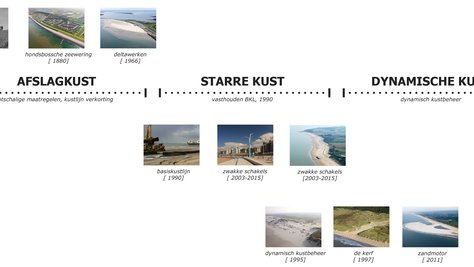Artikel in Built Environment: Delta Urbanism: New Challenges for Planning an Design in Urbanized Deltas. Research by Design on the Dutch Coastline: Bridging Flood Control and Spatial Quality.
Nieuws
artikel in Built Environment

10 juli 2014
Amersfoort
Atelier Kustkwaliteit was een tweejarig onderzoeksprogramma. Door middel van ontwerpend onderzoek met een multidisciplinair team, de kustprovincies, het deltaprogramma kust, de gemeente Den Haag, van Oord b.v. en de TU Delft, werd de toekomst van de Nederlandse kust verkend. Het doel was het samenbrengen van waterveiligheid en ruimtelijke kwaliteit en zo een aantrekkelijk, veilig en vitaal perspectief voor de Nederlandse kust te scheppen. Het artikel geschreven door Nikki Brand, Inge Kersten, Remon Pot en Maike Warmerdam laat zien hoe de methode en resultaten van het onderzoek tot vier waarden voor kustkwaliteit; 1) natuurlijke dynamiek benutten, 2) Meegroeien, 3) Ruimte winnen/maken en 4) Stimuleren van differentiatie, hebben geleid.
Abstract
The Dutch coast struggles with what’s been called ‘the coastal squeeze’. A combination of rising sea level and subsequently eroding coastline puts greater emphasis on keeping the protection level of the coastal defense-system up to date, while simultaneous intensification of land use claims leads to habitat loss of coastal organisms (Doody, 2004). A growing appreciation for diverse and dynamic ecosystems combined with a demand for attractive and competitive seaside towns, that offer a comfortable environment for tourists and residents alike, leads to increasing requests on behalf of ‘spatial quality’. Furthermore a growing societal demand to be involved in the decision making process concerning the built environment exists while the traditional role of planners and engineers is questioned. This increasing complexity puts existing approaches to address flood risk to the test and makes it harder to realize interventions that meet the wishes of local communities. In 2011 a unique initiative set out to address this challenge: the Coastal Quality Studio. On behalf of multiple initiators and powered by a multidisciplinary core-team, more than thirty participatory research-by-design studios on a wide-ranging selection of themes were organized to study the challenges and possible solutions for the future development of the Dutch coast. Both the method and the results of the Studio are addressed in this paper, as are its four key values of coastal quality: involving and accommodating natural dynamics, being adaptive to future sea level rise, providing space for development, and stimulating diversity. The Studio’s method applies not only to the Dutch coast but would be a helpful tool for integral interventions on other coasts as well.
